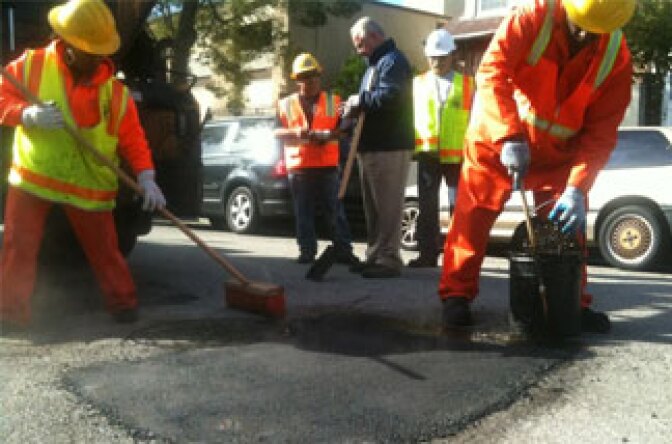This story is free to read because readers choose to support LAist. If you find value in independent local reporting, make a donation to power our newsroom today.
This archival content was originally written for and published on KPCC.org. Keep in mind that links and images may no longer work — and references may be outdated.
Utilities may have to pay more to dig up LA streets to get to pipes

In Los Angeles, where one-third of all roads are rated poor to failing, a city committee is looking at raising the fee the city charges utilities that dig up roads for projects.
Advocates argued a higher Street Damage Restoration Fee could raise millions of dollars to put a dent in the city's multi-billion-dollar backlog of street repairs.
On Wednesday, nearly a year after an audit criticized L.A.'s Bureau of Street Services for undercharging utilities for damage caused by street cuts, the City Council's public works committee is scheduled to recommend an increase in the fee.
Councilman Joe Buscaino, who chairs the committee, is moving to ask staff to rewrite the fee to charge the full cost of future street repairs caused by contractors and utilities' cuts.
"The taxpayers shouldn't have to be footing the bill because utilities perhaps aren't repairing a street correctly after they put in their new infrastructure under the street," said Councilman Mitch Englander, who co-authored the proposal.
The City Controller's audit said the Bureau has collected only $72 million in street damage fees since it was imposed in 1998. That is $190 million less than it projected.
The fee was imposed to recover the cost of long term repairs caused by some 200 cable, TV, internet, water, power and other utilities that cut open city streets. Those cuts shorten a street's life, especially when made in the first few years after repaving, before concrete and other materials have time to cure.
But the Bureau of Street Services underestimated the volume of street cuts. It also underestimated inflation of materials - and it overestimated how much it could collect in the fees.
It projected it could collect more than $16 million per year. The fee actually averaged about $4 million a year.
One of L.A.'s largest utilities, Southern California Gas Co., is not charged the fee at all.
Spokesman Javier Mendoza said the company's policy is to leave city streets in as good or better condition than before it cut into them.
"SoCalGas would consider the payment of an additional street repair fee on top of our franchise fees to be duplicative and excessive," Mendoza said.
He said the company paid the city $87 million over the past 5 years in franchise fees. The company is in talks to renew its franchise agreement, which expires in June 2016.
The Bureau of Street Services argued several months ago in response to the audit that the fee was not meant to recover all the costs of tearing up the street, but was set at a level that would change the behavior of utilities, making them more hesitant to dig.
However, the controller found that the number of street cuts was trending up in spite of the fee.
In his report, he said this shows that not only does the fee fail to cover costs, "it is also not deterring excavations."








